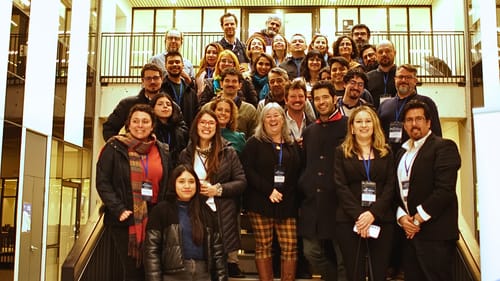
DiPLab’s Paola Tubaro and Antonio Casilli Examine AI Labor and Environmental Impacts in Santiago, Chile
DiPLab - Sunday, August 10, 2025DiPLab researchers Paola Tubaro and Antonio Casilli recently completed a research mission to Santiago, Chile, participating in key academic events that advanced understanding of artificial intelligence’s social and environmental dimensions.

Tubaro delivered a keynote address at the 4th annual workshop of the Millennium Nucleus on the Evolution of Work (M-NEW), where she serves as a senior international member. The interdisciplinary workshop convened labor scholars from across Latin America and internationally to examine contemporary work transformations. Her presentation drew on DiPLab’s multi-year research program investigating the invisible human labor underlying global AI production. Tubaro’s analysis traced the evolution of this work form over two decades, demonstrating that while core functions in smart system development have remained consistent, the scope and volume of these tasks have expanded significantly.

Tubaro and Casilli also participated in the inaugural meeting of SEED (“Social and Environmental Effects of Data connectivity: Hybrid ecologies of transoceanic cables and data centers in Chile and France”), a new collaborative research project between DiPLab and the Millennium Nucleus FAIR (“Futures of Artificial Intelligence Research”). The project has received joint funding from the ECOS-SUD programme (France) and ANID (Chile) to analyze the complete AI value chain, examining production, development, employment impacts, usage patterns, and environmental consequences through comparative study of the Valparaíso-Santiago de Chile and Marseille-Paris corridors. In their SEED presentations, Tubaro and Casilli introduced the concept of the “dual footprint” as an analytical framework for understanding the interconnected environmental and social impacts of AI systems. This heuristic device captures commonalities and interdependencies between AI’s effects on natural and social environments that provide resources for its production and deployment. DiPLab researchers framed the AI industry as a transnational value chain that perpetuates existing global inequalities. Countries driving AI development generate substantial demand for inputs while externalizing social costs through the value chain to more peripheral actors. These arrangements distribute AI’s costs and benefits unequally, resulting in unsustainable practices and limiting upward mobility for disadvantaged countries. The dual footprint framework demonstrates how environmental and social dimensions of AI emerge from similar structural dynamics, providing a unified approach to understanding AI’s comprehensive impact on global resource systems.
